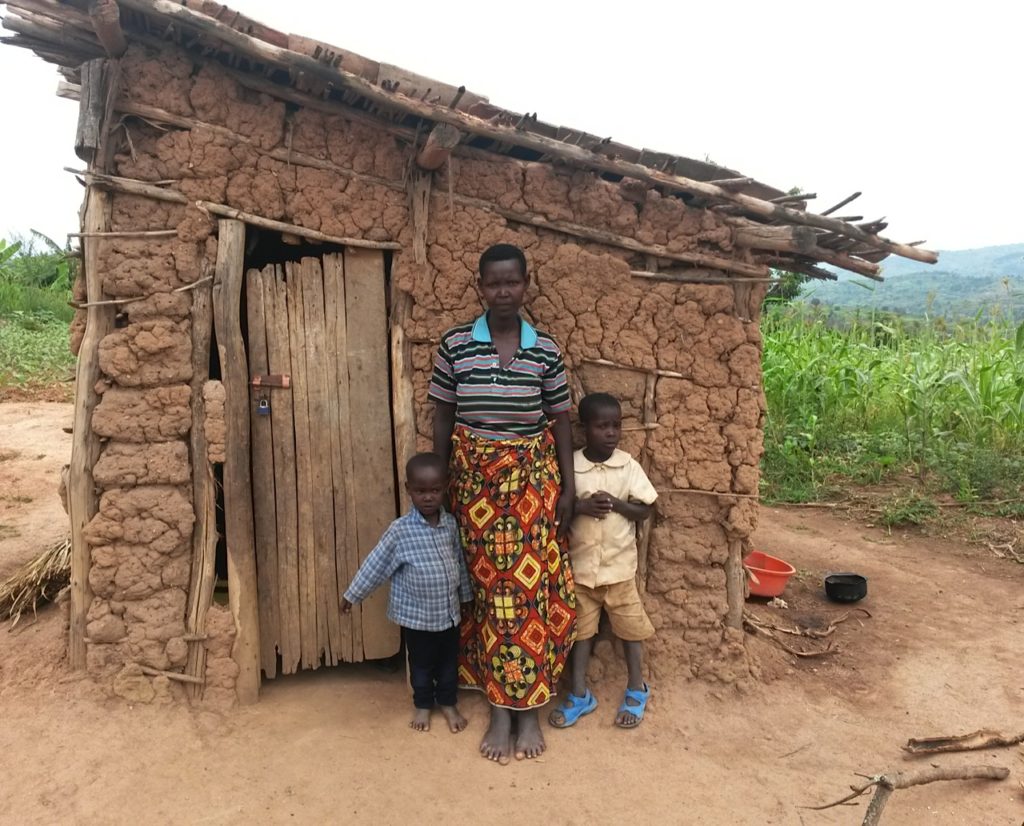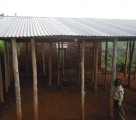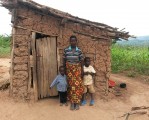
As the Rwandan Government winds down the work of the Fund for the Support of Genocide Survivors (FARG) in housing and secondary school education, some survivors are still left with poor housing. SURF is therefore pleased to be able to support in small, but nevertheless important, ways the housing needs of the most vulnerable. Our most recent project is in partnership with the London, UK-based group “Women for Rwanda”. Their drive and compassion for Nyira, a mother of two, is really helping by giving her and her young family a new home.
Decent housing remains an issue for many vulnerable people in Rwanda, and especially those who survived the genocide. Some, like Nyira, still do not have decent homes, and others, who had houses built for them many years ago, face difficulties in paying for repairs such as leaking roofs. Despite considerable efforts by FARG, Rwanda’s Auditor General has criticised the organisation for failing to meet housing objectives and for poor quality construction. On a Big Lottery field visit recently, SURF observed some of the new homes built in the Western Province by FARG subcontractors, that, worryingly, did not include any walls (see picture). MINALOC, the Ministry for Local Government, takes these matters very seriously.

Women for Rwanda (WFR) began their project in a coffee shop in London, in December 2012, after a university course ‘Rwanda: politics of change.’ The course was run like an action project and tasked the students in the class to propose an initiative to help the thousands of women who were raped during the Rwandan genocide in 1994.
Learning about the problems many women in Rwanda still face as a consequence of the events in 1994 inspired a small group of students to find out if there was actually something they could do to help. This led to the creation of Women for Rwanda (WFR), a grass roots organisation that aims to empower women who were made victims of sexual violence during the genocide.
After several months of research and fundraising, WFR travelled to Rwanda to learn more about the problems first-hand, and observe work that’s already being done. What became clear from day one was that the situation for many women was very complex, and it would be difficult, if not impossible, to find a single solution to help all. The stigma caused by rape means that most women are segregated from society in one way or another, some geographically, some by social exclusion, or both. After almost 21 years after the genocide, many of them still struggle to find work, and often do not have family members to support them. Some women have, at times, resulted to sex work in order to make a living and in some cases their health has been affected as a consequence.
On their trip to Rwanda the WFR group met Josee, a Rwandese psychologist who works with a community of women in a number of small villages around Butare, south Rwanda. The clientele of around 60 women whom Josee supports were all exposed to sexual violence during the genocide, and Josee provides them with psychological therapy to help them heal from their traumatic experiences. Josee introduced WFR to one of the communities, and later, through group discussion, the community identified one of the women, Nyira, as the one in most urgent need of help.
Nyira’s story: Nyira is a mother of two young children, ill and unable to work. The family doesn’t have a home. To have shelter over their heads Nyira rents a small room from her neighbour and pays by doing small household chores such as washing. The women in the community raised Nyira’s situation as the most deserving of help, as, like Josee puts it, “it’s difficult to help anyone heal physically or emotionally, if they don’t have a home”.

How you can help Nirya?
Thus, as their first project, WFR is building a house for Nyira and her two children in partnership with Survivors Fund (SURF).The project began this spring by buying Nyira and her children a plot of land. The fundraising is still on-going, but the plan is for Nyira and her children to move into their new home at the end of the summer. You can help make it happen by donating to the project now.
